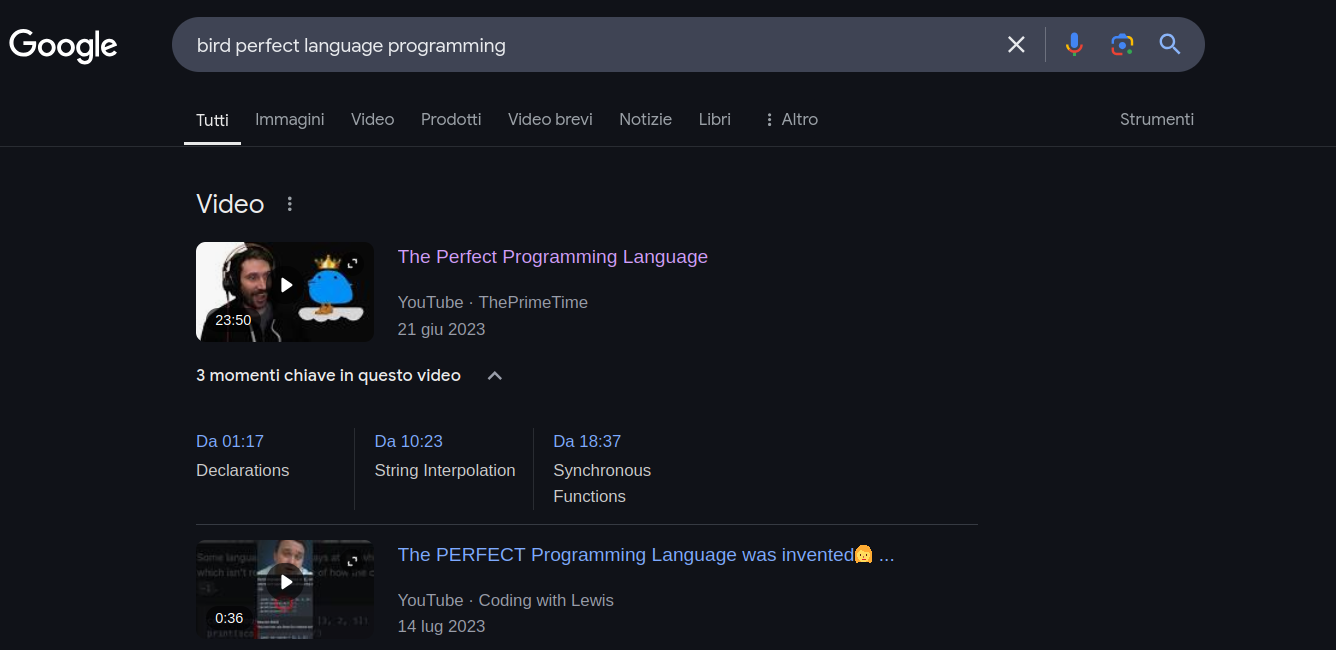Challenge description
As a bird soaring through the sky, you seek the perfect language, and then… you find this
Files
Writeup
Opening the chall.db3 file, I come across a weird programming language that looks kind of like JavaScript. The code is full of strange symbols and conventions, and without a guide, it’s pretty hard to figure out what it does.
My go-to move is always to check the challenge description for hints. Here, the words bird and perfect language are italicized, which seems important. So, I search for “bird perfect language programming” online.
The first result is a video by the streamer ThePrimeTime, where he talks about this exact programming language.

From the video’s description, I find my way back to the GitHub repository that explains this language: https://github.com/TodePond/GulfOfMexico.
It looks like it was originally called “DreamBerd,” but now it goes by “GulfOfMexico.”
DreamBerd - A Perfect Language
Be bold! End every statement with an exclamation mark!
print("Hello world")!
I start thinking about ways to decipher the code and come up with the idea of writing a script to rewrite it into an existing language (one with an existing interpreter!).
At first, I consider converting it to Python, but then I realize JavaScript would be a better choice since it’s closer to the original language.
So, I write a Python script to convert the code to JavaScript and run it to see the output.
Converting DreamBerd to JavaScript
The key here is that we don’t need a perfect (pun intended) conversion—just something accurate enough to run the challenge code. It doesn’t have to handle every possible DreamBerd program, just this one.
The first thing we need to do is to fix the lifetimes in the code.
Gulf of Mexico has a built-in garbage collector that will automatically clean up unused variables. However, if you want to be extra careful, you can specify a lifetime for a variable, with a variety of units.
In particular, the one bit we cannot tollerate are negative lifetimes:
Variable hoisting can be achieved with this neat trick. Specify a negative lifetime to make a variable exist before its creation, and disappear after its creation.
print(name)! //Luke const const name<-1> = "Luke"!
#!/bin/env python3
import sys
import re
def fix_lifetimes(lines):
new_lines = []
for i, line in enumerate(lines):
match = re.match(r".+<(.+)>.+", line)
if not match:
new_lines.append(line)
continue
lifetime = match.group(1)
if lifetime == "Infinity":
new_lines.append(line)
continue
lifetime = int(lifetime)
if lifetime >= 0:
line = line.replace(f"<{lifetime}>", "")
new_lines.append(line)
continue
new_pos = max(len(new_lines) + lifetime, 0)
# remove the invalid lifetime
line = line.replace(f"<{lifetime}>", "")
new_lines.insert(new_pos, line)
print(f"Moved line {i + 1} -> {new_pos + 1}", file=sys.stderr)
return new_lines
lines = sys.stdin.readlines()
program = fix_lifetimes(lines)
program = "".join(program)
Then we need to replace each “strange lang” construct with the corresponding JavaScript construct.
!-> nothingprogram = re.sub(r"!+", "", program);->!for i in range(1, 100): program = re.sub(r";([\w|!|(|)]+)", r"!(\1)", program)Every kind of variable declaration is replaced with
let.program = program.replace("const const const", "let") program = program.replace("const const", "let") program = program.replace("const var", "let") program = program.replace("var var", "let")The variable
42(which is an invalid identifier in JavaScript) is replaced withvar_42.program = re.sub(r"let (\d+)", r"let var_\1", program)Every usage of
42is replaced withvar_42.program = program.replace("42 +=", "var*42 +=") program = program.replace("42 -=", "var_42 -=") program = program.replace("42 *=", "var*42 *=") program = program.replace("42 ^ ", "var*42 ^ ") program = program.replace("42 = ", "var_42 = ") program = program.replace("42 * ", "var*42 * ") program = program.replace("42 / ", "var_42 / ") program = program.replace("42 % ", "var_42 % ") program = program.replace("42 + ", "var_42 + ") program = program.replace("42 - ", "var_42 - ") program = program.replace("!42", "!var_42")Remove
Infinitylifetimes.program = re.sub("<Infinity>", "", program)Replace
functiwithfunction.program = re.sub(r"functi (.+?) \(\) =>", r"function \1()", program)Replace
printwithconsole.log.program = re.sub(r"print", "console.log", program)Fix array starting convention, as in DreamBerd arrays start at -1 (oh, the horror).
# arrays start at -1 ... program = re.sub(r"(\w+)\[(.+)\]", r"\1[\2 + 1]", program)
Finally, we print the program.
print(program)
Then we use the script to convert the code to JavaScript.
cat chall.db3 | python3 invertlines.py > chall_ok.js
And we then run the code with Node.js.
$ node chall_ok.js
[
84, 82, 88, 123, 116, 72, 105, 53, 95,
73, 53, 95, 116, 104, 51, 95, 80, 51,
114, 102, 51, 99, 116, 95, 108, 52, 110,
71, 85, 52, 103, 51, 33, 33, 33, 33,
33, 33, 125
]
The result we get is an array of integers. We can convert it to ASCII to get the flag.
#!/bin/env python3
m=[
84, 82, 88, 123, 116, 72, 105, 53, 95,
73, 53, 95, 116, 104, 51, 95, 80, 51,
114, 102, 51, 99, 116, 95, 108, 52, 110,
71, 85, 52, 103, 51, 33, 33, 33, 33,
33, 33, 125
]
for i in range(0, len(m)):
print(chr(m[i]), end="")
$ python3 decode.py
TRX{tHi5_I5_th3_P3rf3ct_l4nGU4g3!!!!!!}
Full script: perfect_bird.py
.jpg) - CC-BY-SA 4.0](https://ctf.ulis.se/writeups/2025/trx/perfect-bird/cover.jpg)